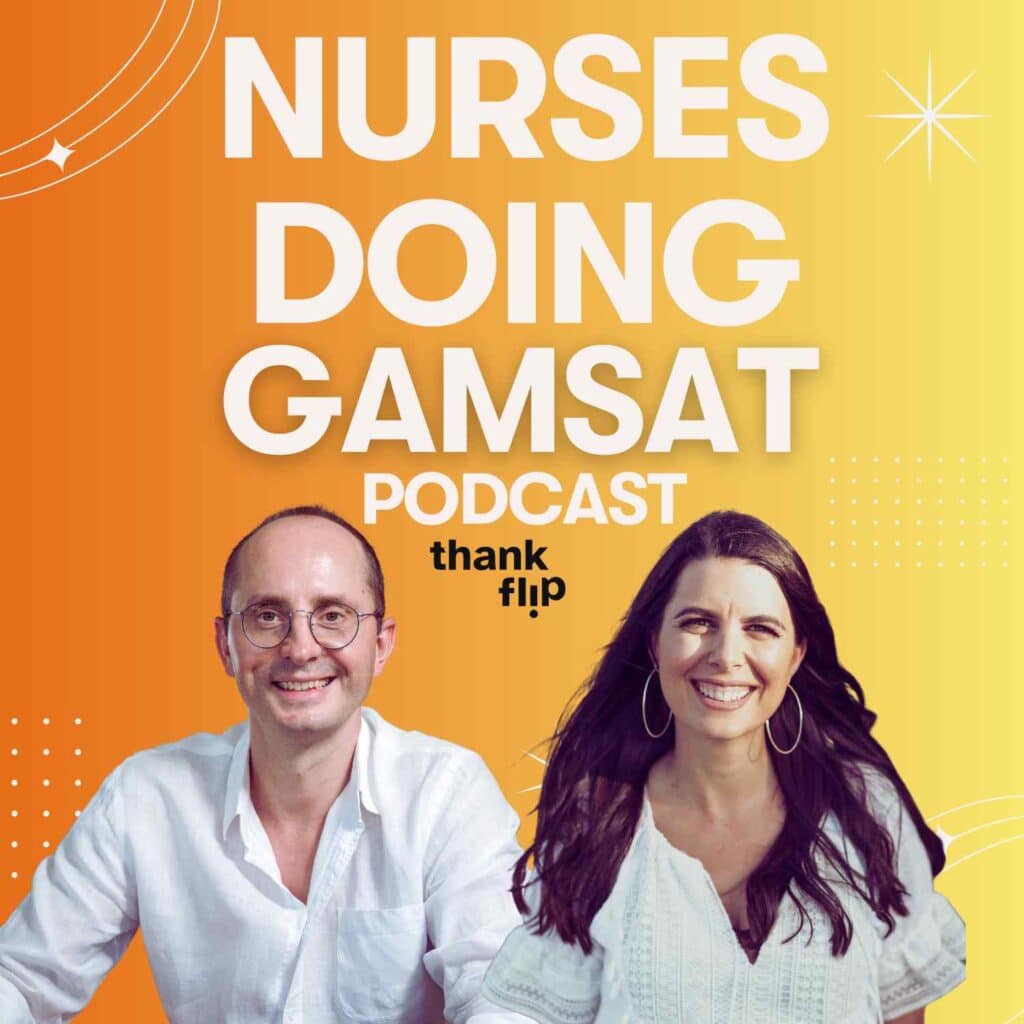In This Episode:
Thinking about applying to Notre Dame or Wollongong for medicine? Then you need to know about CASPer—and just how important it really is. In this episode, Dr Tom is joined by Shabby, a 4th-year med student who scored in the top quartile for CASPer and now coaches others to do the same. Together, they unpack what CASPer actually tests, how it’s used in med school admissions, and what most students get wrong. If you’re aiming for medicine and CASPer is part of your application, you can’t afford to miss this. 🚀
Resources Mentioned:
- Join our CASPer training program
- Medical School Admissions Criteria comparison table
- Join our Nurses Doing GAMSAT Facebook group for any questions
Tom Forfa (00:18)
Welcome back everyone to the Nurses Doing GAMSAT podcast by ThankFlip GAMSAT. I’m Dr Tom, CEO and founder of ThankFlip, and we’re joined today by Shabby. Welcome, Shabby.
So, Shabby is a fourth-year University of Notre Dame medical student. We’re talking about CASPer today – if you didn’t already guess from the title of this episode.
Shabby (00:31)
Hello! Thank you.
Tom Forfa (00:45)
Shabby did the CASPer herself, got the top score – fourth quartile – and has been tutoring and coaching students on CASPer ever since. She’s here today to talk about all things CASPer. We’ll be covering what it is, what it isn’t, how to prepare, common pitfalls, tips, and how we can help you succeed. So, welcome again, Shabby.
Shabby (01:13)
Awesome, thank you so much, Tom, for having me. It’s lovely to meet you all and lovely to be on this awesome podcast. Thanks everyone for tuning in – I’m so happy to be here to answer any questions and to talk about my own journey with CASPer.
Tom Forfa (01:30)
So CASPer – it’s kind of a new thing, relatively speaking. It’s come into a couple of the medical schools. Can you tell us a bit about it? What’s the big deal? Why are we talking about CASPer today?
Shabby (01:47)
Yes, of course. You might already be aware that in the medical admissions journey, we have a few things that are required – like the GAMSAT, GPA – and they’re all kind of number-based or academic assessments. But when you’re working as a medical student, or in allied health, or as a doctor, it’s not just about what you know – it’s about how you communicate, how you show empathy, how you connect with people. That’s a huge part of being a medical professional.
And that’s where the CASPer comes in. A lot of unis have started to realise that academics alone don’t necessarily make a great doctor or nurse. CASPer is an online test – a situational judgment test – that looks at how you respond to various interpersonal, ethical, and critical thinking scenarios. It also looks at your personal qualities.
Tom Forfa (02:53)
So, situational judgment test – that still feels like a vague term. What kind of situations? What kind of judgments?
Shabby (03:00)
Sure! The scenarios vary. Some are based in a medical context – for example, you might be dealing with a patient who is upset about the care they’ve received, or maybe someone’s being aggressive in a clinical setting. The test might ask, “How would you handle that?”
Other scenarios are academic – like you notice a peer cheating on an exam. What do you do? Do you report them? Do you talk to them? What’s your response?
So they’re generally interpersonal scenarios where you’re interacting with others – and they can be set in lots of different contexts.
Tom Forfa (04:01)
Yeah – and they can get pretty awkward. One I remember from the actual Acuity Insights site (the people who run CASPer) was a video scenario: you’re in an office, you go to the printer, and see a document that’s been falsified by your boss. Then someone else walks up and says, “What’s that?” What do you do?
Another one: you and a friend are out and you see an elderly man trying to cross a busy road. He looks dishevelled, not properly dressed. What do you do in that situation?
Shabby (05:02)
Yes, absolutely.
Tom Forfa (05:27)
These are realistic but tricky situations. They want to see how you manage them – and as a medical professional, that’s a big deal.
Shabby (05:32)
Exactly. In medicine, everything is unpredictable. You don’t know who’ll walk through the door at any time. So being able to respond to different scenarios – and quickly – is essential.
Tom Forfa (05:49)
Let’s talk about how the test actually works. What’s the format?
Shabby (06:00)
Sure. CASPer is done online, on your own device, from home. Not like the GAMSAT where you have to go to a testing centre. It’s done via the Acuity system.
There are around 12 scenarios. Some are presented as videos, others as written prompts. You’ll have to respond in two ways: some are written responses, and some are video-recorded responses. The text-based questions usually give you 3–4 minutes to type your answer. The video ones give you about a minute to record a response.
Tom Forfa (07:13)
So both the questions and responses can be written or video?
Shabby (07:18)
Exactly. A good mix.
Tom Forfa (07:25)
That adds an extra layer – because with the video, they’re also assessing how you come across. Your tone, body language, expression – all of it matters.
Shabby (07:38)
Yes, 100%. Communication isn’t just verbal – it’s also non-verbal. Your tone, your vocabulary, your presence – it all counts.
Tom Forfa (08:07)
And this shift is about encouraging more emotionally intelligent communication in medicine. Which is great.
Shabby (08:24)
Absolutely. I’ve encountered doctors who didn’t have great non-verbal communication. It’s great that the unis are looking at that now.
Tom Forfa (08:35)
So what are they really looking for with CASPer?
Shabby (08:55)
Markers are thinking: “Would I want this person to be my doctor?” That’s the mindset.
They’re looking at communication skills – can you communicate clearly, concisely, compassionately?
Empathy is huge. And it’s important to understand the difference between sympathy and empathy. Sympathy is “I feel bad for you.” Empathy is “I understand what you’re going through.” It’s deeper.
They’re also assessing critical thinking – can you stay calm and respond appropriately in high-pressure, unfamiliar situations?
Tom Forfa (10:41)
And ethics and professionalism?
Shabby (10:48)
Definitely. That’s why you’ll get scenarios with grey areas. They want to see if you can think ethically – concepts like non-maleficence, beneficence, justice, autonomy.
Professionalism is also key – especially in workplace scenarios.
Tom Forfa (11:36)
Interesting, because that’s something they also teach in med school.
Shabby (11:43)
True – but some things can’t really be taught. They want to see if you already demonstrate professionalism and ethical thinking to some degree. It’s about your personality and maturity.
Tom Forfa (12:13)
Yeah, and since it’s postgrad medicine, you’re expected to have more insight than a school leaver. You don’t need to be a finished product – just show the potential to grow.
Shabby (12:46)
Exactly. That’s why it’s not about having the “right” answer – it’s about showing how you think and behave.
Tom Forfa (13:16)
It kind of sounds like an interview.
Shabby (13:33)
It really does! And I agree – I think eventually it might even replace interviews.
Tom Forfa (13:53)
Maybe – the main difference is that MMI interviews are more medically focused. CASPer is broader.
Shabby (14:06)
True. In the application process, GPA, GAMSAT and CASPer are all important. At Notre Dame, for example, those three are each worth 30%, with 10% for bonuses.
Tom Forfa (15:19)
Yeah, we’ve got a full med school summary page – we’ll link it in the show notes – that breaks this down.
Notre Dame (Fremantle and Sydney) and Wollongong are the only ones currently using CASPer. And at Notre Dame, CASPer is weighted equally with GAMSAT and GPA.
Shabby (18:16)
It’s actually more important than most people realise.
Tom Forfa (18:22)
Exactly. So what are the biggest misconceptions about CASPer?
Shabby (18:39)
The biggest one is people think you can’t prepare for it – or that it’s not worth preparing for. That’s not true. Practice is essential.
It’s timed and stressful, so you need to get used to typing and speaking under pressure. Practising scenarios helps immensely.
Tom Forfa (19:44)
Yeah – it’s one thing to know what you’d do. It’s another to articulate it clearly and concisely.
Shabby (19:50)
Exactly. Another misconception is that being “super nice” is enough. But markers are trained. They can tell when answers are superficial or disingenuous.
You need to weigh up multiple perspectives and show ethical reasoning – not just be polite.
Tom Forfa (21:11)
Yeah – like pretending you’d throw yourself into danger to save someone, when realistically that’s unwise and unsafe.
Shabby (21:40)
Exactly. Markers can see through those “heroic” but unrealistic answers.
Tom Forfa (22:22)
Also, people think they should show their “passion for medicine” – but that’s not what this is testing.
Shabby (22:31)
Exactly. That’s more appropriate for interviews – not CASPer. Stay focused on answering the question properly.
Tom Forfa (30:08)
Yeah, cool. All right. And so then we’ve covered a lot today. And you know, with some sample question there and all the different tips and things. But then if you want more help, let’s take you behind the scenes on our CASPer training program, which we are releasing any day now. By the time you guys see this, it’s probably going to be released.
Shabby (30:34)
Yes, I would love to. We’ve worked very hard with Tom, and had Amlan and Parthi on the team who’ve worked so hard on creating these resources. We haven’t just popped these out of nowhere – this is from years of experience in the CASPer teaching space…
Tom Forfa (45:51)
Yeah, and just more specifically on that – what’s really important about those training videos is that you and Amlan teach how to structure answers, how to do them within the time conditions, and give real strategies.
Shabby (46:34)
Definitely, and it’s a program that contains everything and anything you need for the CASPer. If I had this when I was preparing, I would have felt so much more confident.
Tom Forfa (47:21)
And so the program is for people applying to Notre Dame and Wollongong – or Curtin if you’re looking at undergrad – and who want to present their thoughts in a clear, ethical and structured way.
Shabby (48:12)
Thank you so much for having me, Tom. It was so exciting to chat about the CASPer.
Tom Forfa (48:17)
Excellent. So if you’ve got any questions, head to our Facebook group *Nurses Doing GAMSAT*. We’ve also got links in the show notes, including our CASPer program and medical school summary page.
Shabby (48:55)
Thank you everyone, good luck with all your prep. Bye!
Watch Now on YouTube:
Ready to Make This GAMSAT Your Last? Book a FREE 1-on-1 Call Now!
Before You Go — Get Your Freebie!
Click here download The GAMSAT Manifesto — our free GAMSAT study guide that has (so far) helped more than 60,000 people crush this highly unusual exam. Oh yeah, and did we mention…it’s free?



